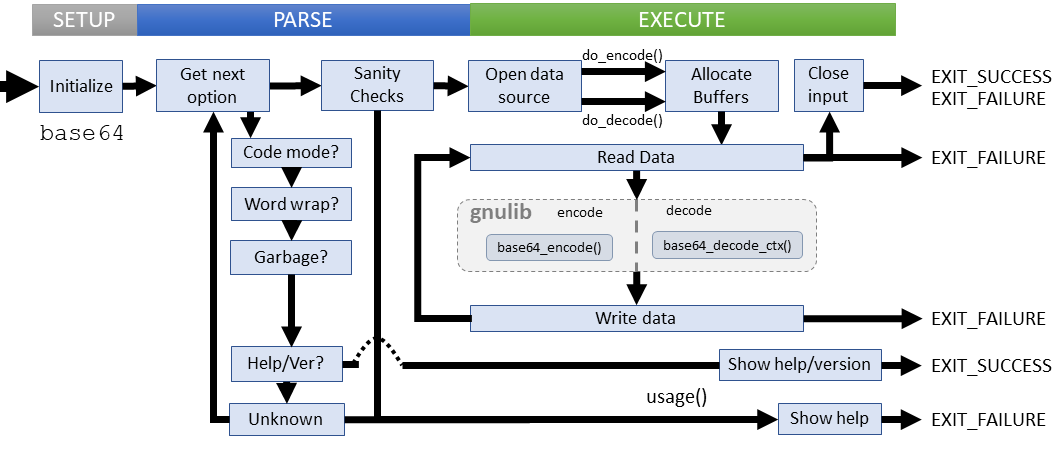[GNU Manual] [No POSIX requirement] [Linux man] [No FreeBSD support]

Summary
base64 - transform data into printable data
Lines of code: 351
Principal syscall: write() with buffering via fwrite()
Support syscalls: fadvise()
Options: 8 (3 short, 5 long)
Number of revisions: Unknown (utility has undergone several name changes recently to basenc.c)
base64 is an encoder/decoder which reads a block of input to a buffer, transforms it, and writes it out. The code in the source file is interchangable between base32 and base64 depending on macro definitions.
Helpers:wrap_write()- Handles word wrap by inserting newlines when appropriate (-w option)do_decode()- The decoder function wrapper forbase64_decode_ctx()(in gnulib)do_encode()- The encoder function wrapper forbase64_encode()(in gnulib)
die()- Exit with mandatory non-zero error and message to stderrerror()- Outputs error message to standard error with possible process termination
BASE32_LENGTH - Determines the I/O buffer size base32 (from gnulib)BASE64_LENGTH - Determines the I/O buffer size base64 (from gnulib)Setup
Preliminary checks to verify appropriate block sizes, for base64, this means checking that BLOCKSIZE is a multiple of 5 and 8. Buffers must be properly sized to include padding.
Local variables defined in main() include:
decode- Flag to toggle encode/decode modeignore_garbage- Flag to ignore characters not part of base64 decoding*infile- The input file name*input_fh- The input file handleoptc- The next command line option to parsewrap_column- The line length to wrap output
Parsing
Parsing base64 considers three questions:
- Are we encoding or decoding (default encoding)?
- How long are the lines before wrapping (default 76 chars)?
- Should we ignore characters that aren't usually printed?
Parsing failures
These failure cases are explicitly checked:
- Unusual line wrap sizes (negative, too large, etc)
- More than one input provided
Failures result in a short error message followed by the usage instructions.
Execution
The utility reads source data into a buffer, transforms it to/from base64, then outputs the data. The transformation function is outsourced to gnulib, leaving the utility with managing data transfer in and out of the buffer. The process is this:
- Open the input, either STDIN or target file
- Call either the encode or decode procedure as requested:
- Properly size the I/O buffers
- Read in a block of data
- Pass the I/O buffers to gnulib: (
base64_encode()orbase64_decode_ctx()) - Repeat read and code until the input is finished
- Close the input
- Return success
Failure may occur at mose points along the way. Completing execution implies successful execution
Failure cases:
- Unable to read or write to I/O files
- Unable to open input file
- Unable to close the input (file or STDIN)